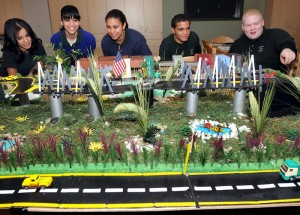I get that there needs to be opportunities to synthesize everything you’ve been learning together since we tend to teach skills in isolation, but I’d like to suggest that if that is the case then EVERY test you give should be cumulative and throughout your class all semester long, every quiz and test and homework and classwork incorporates all skills and concepts that are part of your curriculum. Of course you can focus on certain skills, but let those new skills be introduced and tested within the context of something which forces the demonstration of previous concepts and skills in such a way where every test is as hard as an exam.
I propose that if we did that, our students would progress farther and deeper with their learning than ever before. I propose that kids do not mind be challenged and I propose that they actually don’t mind working really hard….as long as what they are doing is engaging.
“…Whew. Ok. Is he done yet? Please let this be over…he is suggesting things which people should not be allowed to say…he is challenging the status quo…”
Sorry.
But, don’t stop there. Keep going! I am also going to propose that there are other ways to evaluate material than multiple choice, short answer, and fill in the blank tests. “…WHAT? IS THIS MAN SERIOUS? Did he just suggest that our current model of evaluation is outdated and out of touch with our students? We’ve used that model for decades without changing it…how could it possibly be anything but great? It worked for me 25 years ago when I was in school, it should work now…” If you really want to evaluate your students understanding of concepts and their ability and desire to apply them, then give them more than a worksheet, word problem, and test at the end of the chapter. Let them build something, create something, work together with some other students to put something together that requires the use of the concepts and then demonstrates those concepts, get out of the classroom and experience your subject material in the real world. Daniel, one of the teachers at my school, said something which I love: if his kids are not out of their seat presenting in front of the other students at least once per week, then he is failing as a teacher. Let those projects span many days. Make them rigorous, incredibly challenging, out of the cliché comfort zone. Help them design complex enough projects that will challenge them to think bigger and to face complicated problems, and have to work together to figure them out. They will not only do it, they will do it well. And their learning experience will be a more meaningful one
And sometimes, you might decide to let technology be a part of those projects. For example, students might create a Windows Phone app which helps students see line graph changes as they drag their fingers across the screen. Or maybe they create a game for the I-PAD which teaches about the economic and environment issues related to over-population. Or maybe they write a program on their Android Smartphone which draws fractal images while blending art and math together. Maybe some students write an Xbox game for the Kinect which simulates the actual throwing motion of a player which uses physics, math, and physical education. But, I also love projects which do not require technology: maybe groups of students write and film a play which is based around principles in chemistry. Perhaps a group of students design a wooden or metal bridge and have to research traffic patterns, structure analysis of materials, geometric principles of support, weight distribution, and environment impacts. Maybe they interview a first generation immigrant, in their own native language, about the differences between our political climate and the one from which they came. Maybe they go to a football game and take accurate notes about each play so that they can write up a statistical analysis of the game for the coach.So, you see my point. Not just project based learning, but project based evaluation.
A new way forward in education might be for teachers to reach out more to students with more than just a textbook. Don’t let the textbook be the center of the classroom, please don’t let the questions at the end of the chapter be their mundane homework each night, and certainly don’t let the test-bank be the only way you determine how well they got the information from chapter 13. And if your exam is the last thing they will do for you in your class, the let the exam be as engaging, interactive, and valuable as your class was.
Let students experience your content by interacting with it.
If that makes sense to you, join us.



